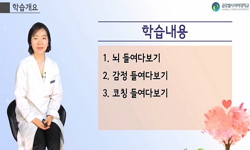The relation between reason and emotions is focussed in this article. I examine how the perception of emotions plays a important role and what ideas of values as contents of perception are characterized in Aristotelian Ethics. In general, emotions are...
http://chineseinput.net/에서 pinyin(병음)방식으로 중국어를 변환할 수 있습니다.
변환된 중국어를 복사하여 사용하시면 됩니다.
- 中文 을 입력하시려면 zhongwen을 입력하시고 space를누르시면됩니다.
- 北京 을 입력하시려면 beijing을 입력하시고 space를 누르시면 됩니다.

아리스토텔레스 윤리학에 나타난 감정과 이성의 상관관계에 관한 연구 = A study on the corelation between passion and reason in the Aristotelian Ethics
한글로보기부가정보
다국어 초록 (Multilingual Abstract)
The relation between reason and emotions is focussed in this article. I examine how the perception of emotions plays a important role and what ideas of values as contents of perception are characterized in Aristotelian Ethics. In general, emotions are regarded as opposition to reason and should be controlled by it, since they are brutal and irrational. But Aristotle propose new concept of emotions, because he thinks that they are a type of perception. According to Nussbaum and Putnam, emotions such as anger, courage and desire belong to the categories of perception based on De anima 403a5. On the other, emotions are described as one of species of pleasures and pains in Nicomachean Ethics 1106b18-21. How can we reconcile two different ideas of emotions? Aristotle is trying to solve this difficulty saying that pleasures are a type of perception. In De Anima all perception are regarded as perceptional mean. Since the activity of 'perceptional mean' is perception and its contents are pleasures and pains, pleasures and pains should be a type of perception. According to Aristotle, feeling pleasures and pains is equivalent to perception of something good or bad. So emotions can be defined as perceptional activity of particulars as good or bad. Emotions are perception of values which particulars have.
So the emotions of virtuous men are harmonized with his reason. That's the reason why Aristotelian virtues shouldn't be regarded as the controlled emotions by reason. Virtues are not a sort of forces which go against emotions nor control of feelings. Rather according to Aristotle virtues are the harmonious relation between reason and feelings. In terms of virtues reason and feelings aim at same target together. Aristotle says that when one gets virtuous tendency, he takes pleasure from virtuous actions. So we can conclude that feelings are not divided from reason in the Aristotelian Ethics.
국문 초록 (Abstract)
이 논문은 이성과 감정의 상관관계에 대해서 고찰하고 있다. 연구자는 감정에 인식적 요소가 어떻게 포함되는지를 살펴보고 그 인식의 내용으로서 가치 개념을 탐구하고 있다. 일반적으로 ...
이 논문은 이성과 감정의 상관관계에 대해서 고찰하고 있다. 연구자는 감정에 인식적 요소가 어떻게 포함되는지를 살펴보고 그 인식의 내용으로서 가치 개념을 탐구하고 있다. 일반적으로 감정은 본능적인 것으로 이성과 대립되고 이성에 의해 통제되어야 할 것으로 간주되었다. 그러나 아리스토텔레스는 감정은 지각이라고 주장하면서 감정의 새로운 정의를 시도하고 있다. 『영혼론』 403a5를 근거로 누스바움과 퍼트남 분노, 용기, 욕구와 같은 감정은 지각의 종개념이라고 주장한다. 그러나『니코마코스 윤리학』 1106b18-21에서 감정은 쾌락과 고통의 종개념으로 기술되기 때문에 이 주장들이 서로 양립가능한지가 연구의 초점이 된다. 아리스토텔레스는 쾌락은 지각이라고 주장하면서 이 난제를 해결하려고 시도한다. 『영혼론』에서 모든 지각은 지각적 중용의 활동으로 제시된다. 지각적 중용의 활동이 지각이고 지각적 중용의 내용은 쾌락과 고통이기 때문에 쾌락과 고통은 역시 지각활동이다. 아리스토텔레스에 따르면 쾌락이나 고통을 느끼는 것은 어떤 좋은 것 또는 어떤 나쁜 것을 지각하는 것이다. 따라서 감정들은 좋음 또는 나쁨으로서 개별자들에 대한 지각활동으로 규정될 수 있다. 감정은 개별자들이 가진 가치들의 대한 지각이다.
이런 측면에서 유덕한 사람의 감정은 자신의 이성과 완벽한 조화를 이루고 있다. 그렇다면 아리스토텔레스에게 있어서 덕이란 이성에 의한 감정의 통제로 간주될 수 없다. 덕은 일종의 감정에 대항하는 힘이 아니며 감정의 억압이나 억제가 될 수 없다. 오히려 아리스토텔레스에게 있어서 덕은 이성과 감정의 조화로운 관계이다. 덕 안에서 이성과 감정은 동일한 목표를 지향한다. 왜냐하면 아리스토텔레스는 우리가 유덕한 경향을 획득할 때 유덕한 행동들을 통해서 쾌락에 도달하게 된다고 주장하기 때문이다. 이처럼 아리스토텔레스에게서 감정과 이성은 분리된 것이 아니다. 물론 이는 감정과 이성이 동일한 것임을 함의하지는 않는다. 또한 그것들이 서로 갈등하지 않는 것도 아니다. 아리스토텔레스는 그것들이 서로 갈등한다는 점을 인지하고 있다.
참고문헌 (Reference)
1 아리스토텔레스, "니코마코스 윤리학" 길 2011
2 Achtenberg, Deborah, "The Role of the Ergon Argument in Aristotle’s Nicomachean Ethics" 9 (9): 37-47, 1989
3 Joseph Owens, "The Doctrine of Being in the Aristotelian Metaphysics" Pontifical Institute of Mediaeval Studies 1978
4 Barnes, J., "The Complete Works of Aristotle: The Revised Oxford Translation" Princeton University Press 1984
5 Achtenberg, Deborah, "On the Metaphysical Presuppositions of Aristotle’s Nicomachean Ethics" 26 : 317-340, 1992
6 Hobbes, T., "Leviathan, or the Matter, Form and Power of a Commonwealth, Ecclesiastical and Civil" Collier Books 1962
7 Achtenberg, Deborah, "Human being, Beast and God: The Place of Human Happiness According to Aristotle and Some Twentieth Century Philosophers" 38 (38): 21-47, 1988
8 Irwin, Terence, "Homonymy in Aristotle" 34 (34): 523-544, 1981
9 Freud, S., "General Psychological Theory" Collier Books 1963
10 Leighton, Stephen R., "Eudemian Ethics 1220b11-13" 34 : 135-138, 1984
1 아리스토텔레스, "니코마코스 윤리학" 길 2011
2 Achtenberg, Deborah, "The Role of the Ergon Argument in Aristotle’s Nicomachean Ethics" 9 (9): 37-47, 1989
3 Joseph Owens, "The Doctrine of Being in the Aristotelian Metaphysics" Pontifical Institute of Mediaeval Studies 1978
4 Barnes, J., "The Complete Works of Aristotle: The Revised Oxford Translation" Princeton University Press 1984
5 Achtenberg, Deborah, "On the Metaphysical Presuppositions of Aristotle’s Nicomachean Ethics" 26 : 317-340, 1992
6 Hobbes, T., "Leviathan, or the Matter, Form and Power of a Commonwealth, Ecclesiastical and Civil" Collier Books 1962
7 Achtenberg, Deborah, "Human being, Beast and God: The Place of Human Happiness According to Aristotle and Some Twentieth Century Philosophers" 38 (38): 21-47, 1988
8 Irwin, Terence, "Homonymy in Aristotle" 34 (34): 523-544, 1981
9 Freud, S., "General Psychological Theory" Collier Books 1963
10 Leighton, Stephen R., "Eudemian Ethics 1220b11-13" 34 : 135-138, 1984
11 Nussbaum, Martha, "Essays on Aristotle’s ‘De Anima’" Oxford University Press 27-56, 1992
12 Apostle, Hippocrates G., "Aristotle’s On the Soul" Peripatetic Press 1981
13 Irwin, Terence, "Aristotle’s First Principles" Clarendon Press 1985
14 Modrak, Deborah, "Aristotle: The Power of Perception" University of Chicago Press 1987
15 Fortenbaugh, W. W., "Aristotle on Emotion: A Contribution to Philosophical Psychology, Rhetoric, Poetics, Politics and Ethics" Harper and Row 1975
16 Leighton, Stephen R., "Aristotle and the Emotion" 27 (27): 144-174, 1982
17 Apostle, Hippocrates G., "Aristotle Metaphysics" Peripatetic Press 1979
18 Bonitz, Hermann, "Aristotelis Metaphysica, Vol.2" Olms 1849
19 Bywater, I., "Aristotelis Ethica Nicomachea" Oxford Universtiy Press 1894
동일학술지(권/호) 다른 논문
-
牟宗三의 주희 도덕철학 이해의 得과 失 - 주희의 心具理와 心知를 중심으로 -
- 범한철학회
- 황갑연
- 2014
- KCI등재
-
- 범한철학회
- 이서규
- 2014
- KCI등재
-
기억, 에토스, 행동 - 아리스토텔레스의 도덕 심리학에서 ‘기억’ -
- 범한철학회
- 조대호
- 2014
- KCI등재
-
- 범한철학회
- 조관성
- 2014
- KCI등재
분석정보
인용정보 인용지수 설명보기
학술지 이력
| 연월일 | 이력구분 | 이력상세 | 등재구분 |
|---|---|---|---|
| 2026 | 평가예정 | 재인증평가 신청대상 (재인증) | |
| 2020-01-01 | 평가 | 등재학술지 유지 (재인증) |  |
| 2017-01-01 | 평가 | 등재학술지 유지 (계속평가) |  |
| 2013-01-01 | 평가 | 등재학술지 유지 (등재유지) |  |
| 2010-01-01 | 평가 | 등재학술지 유지 (등재유지) |  |
| 2008-01-01 | 평가 | 등재학술지 유지 (등재유지) |  |
| 2005-01-01 | 평가 | 등재학술지 선정 (등재후보2차) |  |
| 2004-01-01 | 평가 | 등재후보 1차 PASS (등재후보1차) |  |
| 2003-01-01 | 평가 | 등재후보학술지 선정 (신규평가) |  |
학술지 인용정보
| 기준연도 | WOS-KCI 통합IF(2년) | KCIF(2년) | KCIF(3년) |
|---|---|---|---|
| 2016 | 0.53 | 0.53 | 0.5 |
| KCIF(4년) | KCIF(5년) | 중심성지수(3년) | 즉시성지수 |
| 0.51 | 0.47 | 1.284 | 0.12 |




 KCI
KCI eArticle
eArticle






